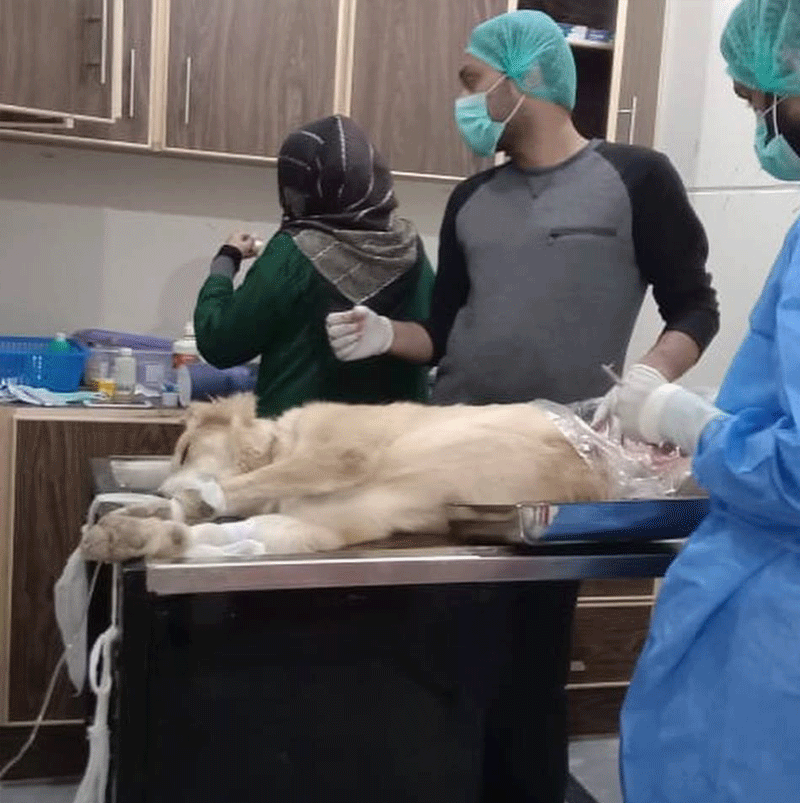Lahore's stray animals find respite from cruelty and abuse at Todd's Welfare Society
Sam is eager to meet new people.
His brown eyes glow with warmth and his tail wags when he sees someone he knows. The only thing unusual about him is his hind legs jerking continuously.
Brownie, another dog, has a similar issue. Her face twitches.
Both dogs have suffered from distemper – a kind of viral disease. They were quarantined, treated and are well now – and looking for a loving home.
So are the 60 other dogs – and 15 cats – who are living in the shelter.
It is a quiet, tranquil place just off the main Lahore-Kasur Road, a little ahead of village Jhulkay. It has been built specifically to accommodate the animals.

For example, besides the main building, which is a couple of rooms meant to be used as an office, and one big back room used for the cat shelter, there are steel cages that line either side of the office building.
One side is used for the dogs that need to be quarantined for any reason – like those who are nervous and prefer to be alone for some time. The other side, dogs are much more social. They are taken outside for walks, and playtime.
Each cage is divided by a wall of medium height. However it certainly does not stop some of the very overexcited dogs in jumping over into their neighbours apartment – and often even lapping the water in their bowls. Even the cats are taken out of their rooms every day for some fresh air and walks.
The Todd’s Welfare Society (TWS) has been running the house for the last two years but on Sunday it was formally inaugurated, with Mr Babar Atta, adviser to the prime minister on polio eradication, starting the event by cutting the ribbon. Later visitors interacted with the animals outside their cages.

Credit for the project goes to Kiran Maheen and her volunteers who work day and night at odd hours, juggling their careers and their studies for this work.
“I had a dog called Todd who left home one day and never came back,” says Kiran. “I felt very depressed but was shocked at everyone’s attitude around me who told me to get another dog.”
She says it dawned on her how people often take animals – even pets to be just commodities, exchanging buying or selling them like accessories. So in memory of Todd, she began a foster care center, which later developed into a full-fledged shelter home and is continuing to expand.
“I was very lucky to have the support of my friends – one is an architect who helped me get the building materials for free, while the other designed the place for free,” she says.
Their motto is to protect animals. They urge people on Facebook to adopt the homeless or abandoned cats and dogs they find and care for, to volunteer help, to donate to help pay for the treatment of injured and sick animals and if nothing then to foster.

‘Studies show that psychopaths, convicted serial killers and rapists are very likely to have abused animals: remember people who harm animals rarely stop there – stop and report animal abuse’, reads their pamphlet.
If it is impossible to believe what extent people can go to, in order to hurt animals, one look at Brutus would explain.
Brutus was being used as a fighter dog, and still bears scars on his face and head of those days. He has only three legs now. He was pit against three other dogs who literally bit his leg off. Because he lost that fight, his owner abandoned him, even as he was injured.

Abdul Moeed, TWS field manager, remembers his paw was full of maggots and they had to eventually amputate him.
There was also a pack of dogs that ate someone’s chickens after which they were trapped, tied up and beaten up so badly that three of them had fractured their legs.
There was also Osha who was attacked with an axe, and Tyson who was shot first and then in a panic when he ran onto the road, a car hit him. He was paralysed and afraid of people, but after some time, trusted the volunteers. Tragically though, he died.
“When animals are mistreated by their owners we have discovered they do not trust anyone,” says coordinator Zehrish Tahir. “It’s very sad actually.”
What is perhaps even sadder is that people are hesitant to take in animals that are not of an expensive breed.

Jamie – who looks like a retriever, with his beautiful golden fur coat, is just a stray dog. When his picture was uploaded to call for adoption, Moeed says about 200 calls a day came to ask about him. “As soon as they learnt Jamie was a stray, those who had professed interest never called back.”
There is also Flora who can play tricks perfectly, but no one seems to want to give her home either.
There are much fewer cats than dogs – and are often easier for the welfare to handle in any case. A furry dark haired Persian called Fudge sits snootily on an upper shelf with just her tail hanging down.

Most are well away from visitors sitting on heights, except a couple others who lazily sleep in their tiny ‘cat rooms’ lined with soft cushions. There are rugs, and cat toys, and bowls full of water and dry food – truly cat heaven.
“Our objective with healthier animals is to trap, neuter or spay and then release,” says Zehrish. “This way their population is controlled, and they are in less danger from humans attacking them too.”
For special cases, there is a temporary shelter on Burki Road or in Cavalry Ground. The volunteers depend a lot on being notified of any animals that need rescuing.
All may not be that dark and grim though.
Osha, who lost an eye because of the axe attack, Sandy and two other dogs were adopted by families in the UK. “It’s sad but it’s also uplifting to know that these dogs were treated so cruelly in Lahore, but now have been given new lives all the way at the other end of the world,” says Kiran.
“Obviously we care a lot for them, but at the end of the day we are constantly in search for a loving home for them. After all they should not be living their lives out in a cage.”
Originally published in Dawn, April 16th, 2019














Comments